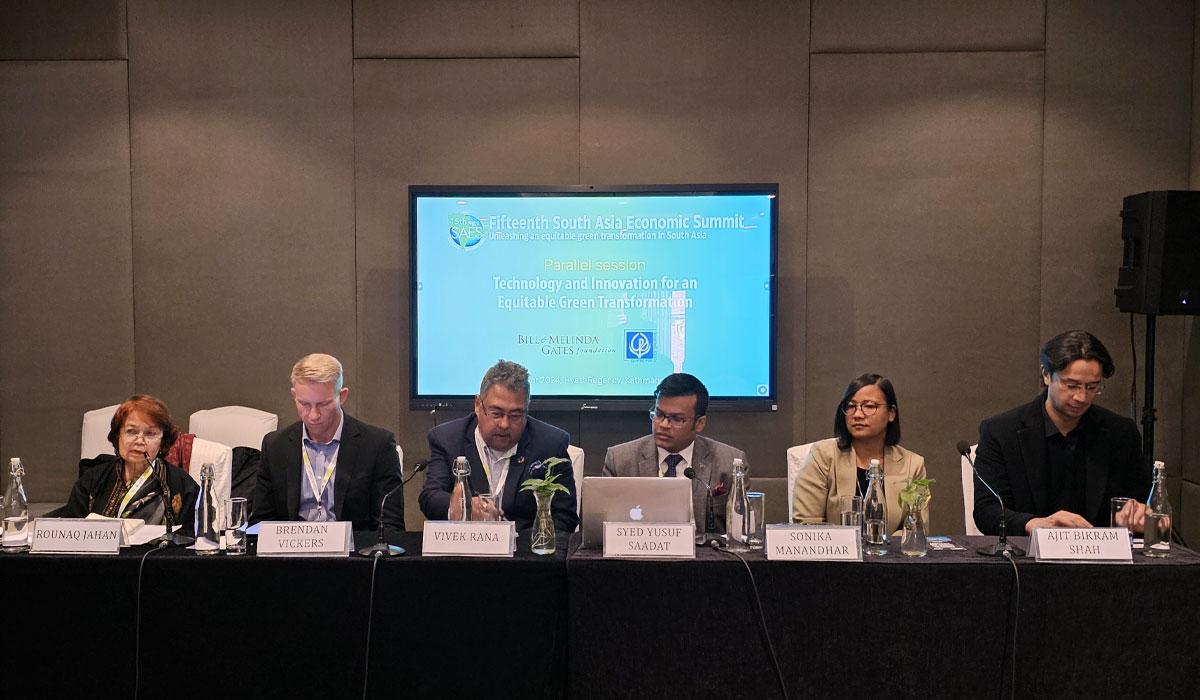
Technology and innovation hold the key to transforming South Asia into a hub for equitable and sustainable growth. Addressing the pressing challenges of climate change requires rethinking how these tools are used, ensuring they not only mitigate environmental damage but also empower marginalised communities. Intellectual property frameworks, inclusive policies, and supportive infrastructures are crucial to unlocking the potential of green technologies and innovations while fostering accessibility and equity across the region.
This discussion took centre stage at the session titled ‘Technology and Innovation for an Equitable Green Transformation’, during the Fifteenth South Asia Economic Summit (SAES XV), hosted by South Asia Watch on Trade, Economics, and Environment (SAWTEE) in Kathmandu from 11–13 December 2024.
Moderated by Professor Rounaq Jahan, Distinguished Fellow at CPD, the event brought together leading experts and practitioners to share insights on aligning innovation with equity.
Professor Jahan stressed the importance of distinguishing between technology and innovation and their roles in promoting an equitable green transformation. She highlighted that innovations are not always technological; sometimes, they could be innovations in practice.
Dr Brendan Vickers, Adviser and Head, International Trade Policy Section, Commonwealth Secretariat, UK, discussed how intellectual property rights can both aid and obstruct the dissemination of critical innovations in less developed countries, advocating for a strategic approach to intellectual property that catalyses sustainable development.
Mr Vivek Rana, an IT expert from Nepal, highlighted the infrastructural challenges in innovation diffusion across South Asia, pointing out that without robust systems and frameworks, significant innovations fail to reach their transformative potential.
Mr Syed Yusuf Saadat, a Research Fellow at the CPD, elaborated on the barriers faced by less developed countries in accessing vital green technologies due to restrictive intellectual property laws, calling for more adaptable regulations that empower rather than exclude vulnerable communities.
Ms Sonika Manandhar, co-founder of Aloi Technology in Nepal, emphasised the importance of data in ensuring green investments effectively reach micro-entrepreneurs, enhancing their capability to participate in the green economy.
Mr Ajit Bikram Shah, Founding Chairman, American Chamber of Commerce in Nepal (AMCHAM Nepal); Director & CEO, Lotus Holdings, shared insights on how the private sector can leverage its resources and innovation capacity to foster a sustainable and equitable green transformation, highlighting the necessity of private sector involvement in global environmental solutions.
The session provided invaluable insights into the multifaceted roles of technology and innovation as tools for sustainable development, highlighting the consensus on the need for policies and practices that promote accessibility and equity in addressing climate change.


